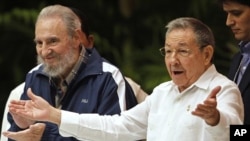Cuban President Raul Castro has been named the head of the nation's ruling Communist Party, officially replacing his brother, former President Fidel Castro, who held the post since the party's founding 46 years ago.
President Raul Castro was named First Secretary Tuesday during a Communist Party Congress in Havana.
Despite raising hopes during the gathering that a new generation of leaders could step up to top posts, the 79-year-old president said 80-year-old Vice President Jose Ramon Machado Ventura would be his No. 2 in the party.
Raul Castro has introduced economic reforms in Cuba, but told the party congress that he will never allow the return of capitalism.
Fidel Castro, 84, making a rare public appearance, also attended the event, wearing a blue tracksuit and looking unsteady on his feet.
Fidel Castro has faced severe problems with his health during the past few years.
In an opinion article in state-run media last month, Fidel Castro said he resigned five years ago from all his official positions, including as head of the Communist Party, when intestinal bleeding nearly killed him in 2006.
Even though it was widely known that Fidel Castro was not working as the day-to-day head of the party, the article was the first time he acknowledged resigning from the post.
Fidel Castro ceded power to Raul Castro in 2006, and in 2008, the younger Castro officially took office as president.
On Monday, Cuban state-run media reported that the Communist Party had approved economic reforms offered by President Raul Castro.
About 1,000 delegates convened for the four-day party convention, which is only the sixth time the party has met in its nearly 50-year history. The last gathering was in 1997.
Raul Castro's proposed reforms come during tough economic times for Cuba.
The reforms include significant changes to Cuba's economic system, including decentralization of the island nation's economy, a shift toward private enterprise and the eventual elimination of ration books and other subsidies. Reforms also include two, five-year term limits for politicians.
Some information for this report was provided by AP, AFP and Reuters.










